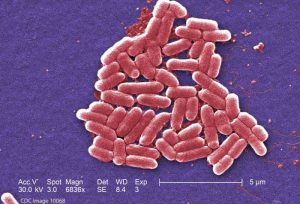Florida is part of an E coli outbreak that includes Georgia and Louisiana, according to the Florida Department of Health. A spokesperson for the Florida DOH told Food Poisoning Bulletin that a case has been confirmed and that they are “using routine processes and working closely with the CDC in the investigation of a potential commonality.”
 News of this multi-state outbreak began this week with the death of a toddler in New Orleans. Our investigation has found that Georgia and Florida also have patients ill with the same strain of E. coli 0145. No particular source has been pinpointed as the cause of this outbreak.
News of this multi-state outbreak began this week with the death of a toddler in New Orleans. Our investigation has found that Georgia and Florida also have patients ill with the same strain of E. coli 0145. No particular source has been pinpointed as the cause of this outbreak.
The CDC has not released any information about the outbreak. The case count is as follows:
- Florida (1)
- Georgia (5)
- Louisiana (3) (1 death)
E. coli is a common bacteria that lives in the gut of mammals. Most strains are benign, but there are a few that produce a toxin that can be deadly. Those bacteria are called “Shiga toxin-producing E. coli“, or STEC for short, and include E. coli 0157:H7, 026, 045, 0103, 0111, 0121, and 0145. STEC bacteria can make you very sick. The serogroups 026, 0111, and 0103 are the bacteria that most often cause illness in this country.
Symptoms of a STEC infection include severe stomach and abdominal cramps, diarrhea which is often bloody, and vomiting. A fever may be present too, but it is usually not very high: less than 101 degrees F. Most people get better within a week, but some people start to recover, then develop a complication called hemolytic uremic syndrome (HUS) in children, or thrombotic thrombocytopenic purpura (TTP) in adults.
HUS and TTP can cause kidney failure. Indications that those complications have developed include weakness, lethargy, and sleepiness. Low platelet counts can cause small unexplained bruises and pale skin. Patients may also have unexpected bleeding from the nose and gums.
It’s important that anyone experiencing these symptoms see a health care provider as soon as possible. Treatment for E. coli infections include rehydration and palliative care. Antibiotics are usually not recommended because they can increase the chances of HUS and TTP.





I think it’s amusing, especially in certain parts of Florida, where it is in the water supply, that treatment for the sickness includes REHYDRATION. That’s pretty odd, isn’t it?
Obviously they need to stop all raw milk production in those states dont you think?
We are not jumping to any conclusions. Raw milk has certainly been responsible for E. coli outbreaks, but so have other foods. Public health officials are working on this.